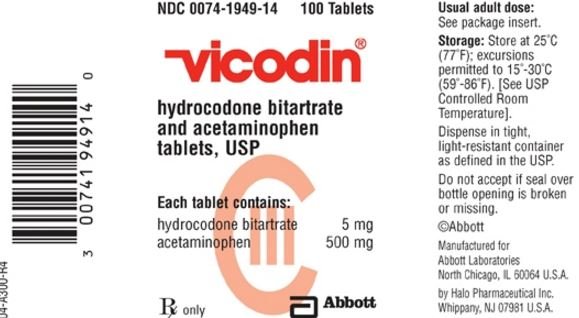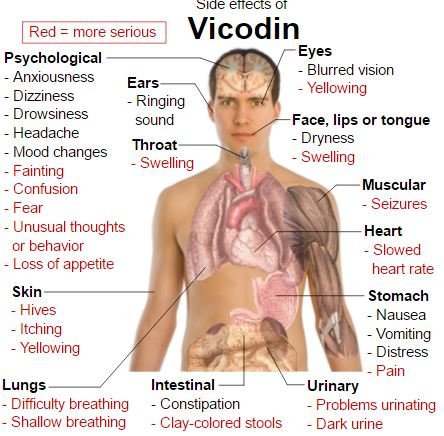How Long Does Vicodin Stay In Your System?
What is Vicodin?
Vicodin is a drug which has a combined content of both hydrocodone which is an opioid narcotic pain reliever and acetaminophen which is the nonopioid analgesic paracetamol component, and also called as hydrocodone paracetamol.

These medicines are indicated to relieve moderate to severe pain sensation among individuals that originates from any acute or chronic pain or that postoperative pain from any surgical procedures.
The generic name of Vicodin is acetaminophen and hydrocodone; the brand names available are Vicodin, Zolvit, Lorcet, Hycet, Norco, Xodol and Lortab. Hydrocodone becomes a more effective pain reliever when it is in joint effect with acetaminophen to allay discomfort of pain from any source.
The usual available dose of vicodin is varying depending upon the composition of acetamenophene (paracetamole), which varies from 500mg to 750mg and hydrocodone with 5 mg to 10mg.
Points to remember before taking Vicodin
It must be taken into special consideration of not taking Vicodin with any recent ingestion of alcoholic drinks, foods and beverages containing alcohol, other forms of narcotic medications, sedatives and tranquilizers because of its most dangerous side effects which might end up the life of a person.
Breathing problems might be encountered among older adults, those who are very ill, those with malnutrition as well as debilitated patients.
Vicodin should always be taken strictly with prescription as its incorrect usage as a narcotic pain reliever can result to an overdose of the drug, an addiction to the drug or a very fatal death.
Never take Vicodin if a MAO (monoamine oxidase) inhibitor was taken within the past two weeks, since MAO inhibitors have antidepressant effect. Vicodin overdose due to its acetaminophen content can lead to liver damage or end with death
An allergy to acetaminophen is not safe to have this drug. This is risky to take for pregnant women due to its life-threatening effect for the babies after delivery. Breastfeeding is not advised to nursing women since Vicodin contents can be passed to the breastmilk and can cause harmful effects.
The different factors influence the duration of Vicodin can stay in the human system, which include age, diet habit, body fat and weight of the person.
How is Vicodin taken?
Vicodin must be taken according to a physician’s prescription and must never be shared with other family members or friends experiencing symptoms of pain. The dosage of the drug is on a case to case basis after a thorough assessment and pain evaluation is done.
Vicodin is usually taken on as needed basis for pain. In some instances where it has a regular time, the missed dose has to be taken the soonest possible time it was remembered; bearing in mind that it is yet far with the next dose to take, otherwise the missed dose can be skipped.
Never attempt to have an extra dose taken for that missed dose, since its effect can be harmful to the body. An overdosage of Vicodin can be deadly, thus it is always best to seek emergency consultation with a physician.
Side effects of Vicodin
Vicodin has side effects that need immediate medical interventions and these are as follows:

- Allergic reactions such as swelling noted on the face, lips, tongue or throat, presence of hives on the skin and breathing difficulty
- Evidence of fatal severe skin reaction like rash, skin redness, blistering and peeling
- Breathing problems and decreased heart rate
- Feelings of faintness or passing out
- Confusing behaviors or unusual thoughts
- Nausea and vomiting, upset pain in the stomach
- Convulsive seizures and loss of appetite
- Signs of bleeding or easy bruising of body parts
- Urine is dark and stools clay-colored
- Yellowish discoloration of the skin or eyes
Withdrawal effects of Vicodin
Vicodine has dependency effect and sudden withdrawl can cause withdrawl effect. The usual symptoms include runny nose, watery eyes, restlessness,vomiting, muscle aches, insomnia, headaches, and anxiety. Therefore, it requires medical supervision during allocation of dose and whole therapy duration.
Detection of Vicodin in the body
Vicodin is a known effective pain reliever because of its rapid entry into the body and lasts about 4 hours. It has a short half-life so that the faster is the metabolism of a person; the lesser is the time that traces of Vicodin can somehow stay in the system.
Traces of this drug can stay within the body until 72 hours or with some adults, traces can still be seen through drug tests even after 5 days of taking the medication. Detection window presents:
- Urine examinations can detect after 72 to 96 hours that the drug is taken
- Saliva examination detects only until 6 to 12 hours after the drug is consumed
- Hair follicle tests which is the most comprehensive form can detect Vicodin traces until 3 to 4 months after the drug is consumed.
References:
Vicodin : Overview, Side Effects, Dosage, Interactions at http://www.drugs.com/vicodin.html
Indications and Components of Vicodin, Possible Side Effects of Vicodin at http://www.med-health.net/How-Long-Does-Vicodin-Stay-In-Your-System.html
How Long Does Vicodin Stay in Your System?, How Long Can a Saliva Test Detect Vicodin?, How Long Can a Hair Test Detect Vicodin? at http://alcoholism.about.com/od/work/qt/How-Long-Does-Vicodin-Stay.htm
Mike McEvoy (June 12, 2008). “Hydrocodone/APAP: Drug Whys”. EMS1. Archived from the original on 2012-07-10. Popularity: First most commonly prescribed drug between 2002-2007 (U.S.)
Garrone, B., Polenzani L., De Santi, S., Moreci, W., and Guglielmotti, A. (2007). “Paracetamol reduces neuropathic pain-like behaviour in rats by potentiating serotonergic neurotransmission” (PDF). Int J Integ Biol 1 (3): 196–205.
Zacny JP, Gutierrez S, Bolbolan SA (June 2005). “Profiling the subjective, psychomotor, and physiological effects of a hydrocodone/acetaminophen product in recreational drug users”. Drug Alcohol Depend 78 (3): 243–52.
